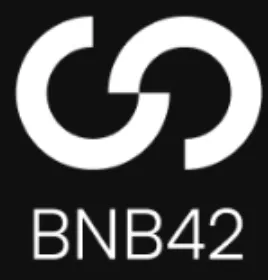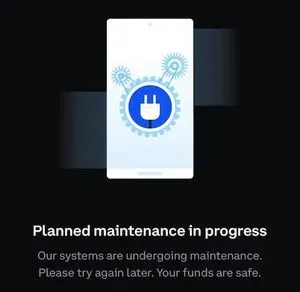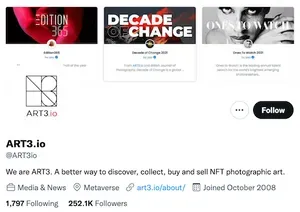Following Ludwig's scathing statement and legal threat, MetaDeckz explained he was just "an artist who saw an oppertunity [sic]" and that he would disband the project. He later released a video explaining that he would stop the project, though his continued references to the cards as "the product" and his statements that he intended to continue working on the cards led some to question if he was just planning to try to monetize them in some other way. If that's the case, he may run into further issues given that the card illustrations all appear to be derived directly from photos of the streamers that don't belong to MetaDeckz.
MetaDeckz ends trading card NFT project after facing legal action from streamers whose likenesses were used without consent
NFT artist "Robness" mints an NFT of a journalist's childhood photo to harass her
Robness decided the best way to make his displeasure known would be to find a photo of Notopoulos as a young child and turn it into an NFT titled "VOTED MOST LIKELY TO BE A FAILED JOURNALIST: KATIE NOTOPOULOS". The NFT description read, "Failed journalism is a true art to master. With Buzzfeed's new article about the Bored Ape Yacht Club, Katie Notopoulos went where no journalist usually goes. She ousted [sic] both of the Bored Ape Yacht Club founders while providing baseless claims of racist tropes about their artwork to further stir up contention. We thank Katie for her continued pursuit in tainting the once respected practice of real journalism. Here we have what is known as doxx art. Enjoy."
The NFT platform where Robness originally listed the NFT, Known Origin, eventually took down the listing. However, due to the nature of blockchains, the NFT itself still exists and can continue to be accessed and traded despite one platform's intervention.
Even Gary Vee gets upset with the shady business in NFTs sometimes
Tabletop roleplaying game publisher Chaosium suspends their NFT project after backlash
BNB42 rug pulls for over $2.7 million
"NFT influencer" Morgan (@helloimmorgan) repeatedly fails to disclose being compensated for NFT promotions
Last year Morgan was caught up in scandal after it appeared she had bought a $24,000 Mutant Ape NFT while simultaneously running a GoFundMe trying to raise $20,000 for medical bills for her grandmother; she claims that the GoFundMe predated the MAYC purchase (though that seems to be in some doubt as well) and that all GFM funds went to her grandmother. Separately from that incident, she also created an NFT project called "Grumpkins" that was supposed to give 20% of profits towards children with cleft palates and also her grandmother's fund; after launching the project she quietly changed the donation amount to 10%.
Lonely Ape Dating Club launches to help Bored Ape NFT collectors find love, or maybe pay for it
The Lonely Ape Dating Club project announced their plans to build a dating app specifically for owners of Bored Ape NFTs — NFTs featuring illustrations of apes that trade for an average of around 90 ETH ($225,000). The app is not currently accepting signups from people who don't own a BAYC NFT, which raises more than a few questions about how successful a dating app will be when its pool of users seems to be overwhelmingly male, though perhaps I'm making too many assumptions about their sexualities. The app does promise plans to release a "Coin Digger" feature, which would "allow non-BAYC owners to connect with higher net worth individuals for mutual benefit", so perhaps that is their plan to solve that problem.
Sadly, the project was cancelled in May 2022 due to "unforeseen circumstances" which I have to imagine were pretty foreseeable.
Leaders of the Canadian truck protest come up with hilariously complex plan to distribute the Bitcoins they've collected
BuildFinance DAO project treasury drained after "hostile takeover"
The Belvedere Museum dreams big (or, rather, small) by splitting one single painting into 10,000 Valentine's Day NFTs
The website for the NFT sale explains a six-step process to obtain one of these NFTs, including the standard steps of connecting a wallet and joining the allowlist, but ending with "Dedicate your NFT to a beloved one", which involves sending... their loved one a form email, apparently. My heart goes out to anyone receiving an NFT for Valentine's Day, much less a $2,000 one representing a portion of a painting smaller than a postage stamp. To anyone who thinks this is a good idea: I am begging you, please just buy your partner some flowers.
One Monero mining pool creeps closer to that crucial 51% of the network hashrate
Jacked Ape Club NFT project team erupts in chaos
The following day, the project announced that control was back in the hands of Orange, Mitchell, Jango, and one other team member, and that the founders would be departing the project. The remaining team also announced that 105 ETH would be returned back to the project; they didn't address the 73 remaining ETH (around $220,000) that was reportedly taken by the founders.
Coinbase experiences an outage during the Super Bowl
This Super Bowl was the first to feature crypto advertisements. In addition to Coinbase's spot, Bud Light announced a beer-related NFT collection, Larry David appeared in an ad for the FTX exchange, and Crypto.com of course had a spot. What better time to make well-researched financial decisions than from your phone after a bunch of Super Bowl beers?
British tax collectors perform their first ever NFT seizure in tax evasion investigation
- "Taxman makes first ever seizure of NFTs", The Telegraph
Founder of an air taxi DAO writes of narrowly avoiding an elaborate scam attempt
While many web3 scammers are fairly primitive in their tactics, these appeared to be running a sophisticated and highly-targeted scam. The pair worked to impersonate an existing web3 project, even buying a similar domain. They apparently hired a 3D artist to produce renderings to help ingratiate one of the scammers into the target's web3 project. And when thomasg.eth inspected the scammers' addresses, he found that they were working with at least 100 ETH in funding (currently equivalent to around $300,000). thomasg.eth is currently holding over $100 million in his wallet with the same name, so it's not hard to see why the scammers might have picked him as a target worth some extra effort.
Crowdfunded TitanReach MMO game project crashes and burns after developer spends investor money on a bad crypto gamble and a Tesla
On February 11, Unravel announced that his studio "would be closing its doors for good. TitanReach will be laid to rest. The reasons for this are private." From there he went into a long message about the previously-unannounced crypto and NFT plans he had for the game, which unsurprisingly enraged the community who had supported the game.
YouTuber KiraTV, who had become close to the project, its developer, and the investor, revealed that the anonymous angel investor had been the cryptocurrency entrepreneur behind Yearn Finance, though Kira said that he believed the investor had not influenced Unravel to add crypto elements to the game. Kira alleged that Unravel had taken $150,000 of money sent by the investor and put it into $TIME, the token associated with the ill-fated Wonderland project. When he lost the money overnight, the investor cut funding for the project. It later came out that Unravel had allegedly used company money to make risky cryptocurrency investments besides the one incident with $150,000, and had even used the investor's money to purchase himself a new Tesla.
Porn actress Lana Rhoades apparently abandons her NFT project after its launch
However, only weeks after launch, Rhoades appeared to have abandoned the project, and most of the funds had been transferred out. Rhoades deleted her TikTok videos in which she had promoted it, and didn't respond to tweets asking about the project. One community member wrote on Discord that they had "spent what [they] can't lose. Spent 4k, on total I had 6k. Man I'm left with 2k only. No job and have a 2 yo son". Hopefully the guy who got the tattoo of the project logo on his shin also isn't too disappointed... The NFTs, which cost 0.1 ETH each to mint (about $250), were selling for around 0.005 ETH (about $15) on February 16, if they were being bought at all.
- Tweet by Coffeezilla
- Tweet by zachxbt
- "Lana Rhoades Rug Pulled Me", YouTube video by CoffeeZilla
Jacked Ape Club triumphantly announces that the project sold out, and that the remaining supply has been destroyed... wait, what?
MoviePass is back, with a blockchain and eye-tracking to keep you glued to ads
BlockFi set to pay $100 million to settle with SEC and state regulators over sketchy lending services
Squiggles project revealed to be part of an NFT scam ring just before launch
- "Squiggles NFTs Delisted From OpenSea… But The Story Gets Weirder", NFT Evening
- "Busting a $20,000,000 NFT Scam (Squiggles)", Coffeezilla (Video)
mtgDAO gets a legal notice from Wizards of the Coast, writes that they are "unfairly discriminat[ing] against web3 tech and web3 communities"
Security firm forced to publicly disclose issues with Atomic Wallet after they go unaddressed for months
New York power plant starts mining Bitcoin, increases emissions by 6x
Locals of the area have demanded that the Department of Environmental Conservation review the air emissions permit for the plant rather than renew an old one, which the DEC agreed to do, though they have delayed a new decision until March 31. Many pressing for permit review were unhappy with the delay, with the Seneca Lake Guardian reporting, "This delay from the DEC is not benign... Every day that Gov. Hochul and Commissioner Seggos drag their feet on this (permitting) decision is another day for Greenidge to continue expanding operations."
On June 30, regulators denied Greenidge's request to renew their permit.
Hackers take more than $10 million from defi project Dego Finance
Creator of Skycoin files lawsuit claiming he was extorted and kidnapped
One defendant in the lawsuit has described the suit as "absurd" and "pretty weird", and said that Smietana has "a history of blaming other people for the failure of Skycoin".
Canadian antivaxxers try shilling crypto after failing to fund their trucker protest
The protesters eventually turned to Bitcoin and other cryptocurrencies for crowdfunding, even appointing a "Bitcoin team lead" who rambled on in a livestream about not "being shackled by the censorship put in place by our legacy financial system", much to the confusion and annoyance of some viewers. One commenter asked, "Are we at a press conference for Freedom Convoy 2022 or having some guy shove Bitcoin down our throats?" As of February 9, the group claims to have raised $300,000 in Bitcoin, and $500,000 in other cryptocurrencies.
Baby Musk Coin rug pulls after a $2 million January ICO
Samsung launches environmental sustainability-themed metaverse scavenger hunt where people plant virtual trees and earn NFTs
The press release doesn't happen to mention that the Decentraland project is built on Ethereum, which was at the time a proof-of-work blockchain that used over 100 TWh of electricity per year — around the same amount as countries like the Netherlands or Finland.
The BBC publishes (and then deletes) a puff piece on a "self-made crypto-millionaire giving back" without mentioning his scam coin
- "Birmingham's self-made crypto-millionaire giving back", originally published by the BBC and archived on the Internet Archive
- Tweet thread by Jim Waterson
- r/Orfano
- "BBC cryptocurrency documentary pulled from air at last minute", The Guardian
Someone appears to trade on insider knowledge of Coinbase listings
- "Evidence of Insider Trading at Coinbase", FullyCrypto
$36 million taken from retirement accounts of IRA Financial customers investing in crypto
Exploit of Superfluid vesting contract nets attacker $8.7 million
Longstanding British photography institution baits-and-switches investors with NFTs
On February 2, some Twitter users were confused to find themselves suddenly following the Twitter account of an NFT operation, as BJP had taken its existing 250,000-follower Twitter account and rebranded it to "ART3.io" and begun promoting various NFTs with posts of "gm". The primary BJP organization started a new Twitter account, @bjp1854, which had a total of around 1,500 followers. On February 8, investors received an email from BJP announcing the company had been sold, and that they would be paying back shareholders £50,000 of the £1.8 million, a 92% loss.
U.S. Department of Justice arrests duo for trying to launder billions stolen from Bitfinex in 2016
News of the arrest came only a week after 20,000 BTC from the Bitfinex hack was observed being moved. Although the DOJ didn't explicitly say that this movement led to the arrest, it seems like a safe bet.
LooksRare team cashes out $30 million in wETH, panicking their community
The discovery of the withdrawal caused panic, with some community members believing it was a sign that the team was rug pulling. Some also questioned the team members' choice to send the funds to a cryptocurrency tumbler, believing this meant they were trying to hide the cash-out from community members. One might understand why they would try to hide it: after the withdrawals became public, the value of the native $LOOKS token crashed around 15%.
More broadly, the fear around the team cashing out illustrates a common belief among some crypto project communities: that if you cash out even some of your holdings, you're not a true believer. A LooksRare team member explained that the team behind the project had "been grinding night and day for 6+ months" without payment and had collectively fronted "more than 7 figures in costs" before the platform launch (reassuring!), and the withdrawal was simply 10+ team members finally receiving payment. Apparently unsatisfied with this explanation, the community tried to demand the team use their wETH to repurchase $LOOKS, though it doesn't appear this has happened.
SuperRare parts ways with its community manager over racist tweets, she hosts a disastrous "apology" Twitter Space
However, as the Space continued and amassed several thousand listeners, several Black women stepped up to express that her apologies didn't seem genuine or self-reflective, and that the Space appeared to be little more than an opportunity for other white people in the web3 community to "forgive" her and pat her on the back, as she gained followers throughout. The women who spoke up immediately began to receive extraordinarily racist and threatening mentions and direct messages on Twitter from various people in the Space.
As the Space was ongoing, more of Christenson's past tweets surfaced, several considerably more recent than 2011, and none involving song lyrics: several that were racist towards Mexicans and one that appeared to be questioning the experiences of rape survivors. When one speaker asked how old Christenson had been when she made the 2016 tweets about Mexicans, Christenson initially dodged. When another listener repeated the question she answered that she had been 26, but that research shows that your frontal lobe isn't fully developed until you're 25... or something. As the Space continued, Black web3 community member mec. kindly suggested that Christenson end the Space and take some time to genuinely reflect. As more Black speakers expressed that they felt hurt by Christenson's actions, the Space abruptly ended. Although the Space was being recorded, Christenson took down the recording shortly after.
Another project tries to sell music NFTs without permission from artists
Also like HitPiece, NFT Music Stream claimed to be doing artists a favor, tweeting, "We are on YOUR SIDE and are going to flip the industry on it's[sic] head by cutting out the middle man & giving control back to you profit wise." They also wrote, "I think a lot of people are missing the point of the project", apparently not understanding why musicians might be less than thrilled to see their work resold without permission.
EarnHub claims they've been hacked for around $284,000
NFT marketplace Cent shuts down over "rampant" fakes and plagiarism, founder says "I think this is a pretty fundamental problem with Web3"
Ubisoft holds internal workshop to address major employee concerns about NFTs, delivers celebratory NFT to employees
Meanwhile, Ubisoft announced that they were creating a celebratory virtual hat NFT to gift to their employees in early March, in honor of the opening of the Ubisoft Quartz NFT platform. Maybe just give them a cash bonus next time.
The team behind Doodled Dragons rugpulls again with "Balloonsville", taunts buyers and the NFT platform they used
UN reports that millions of dollars in stolen crypto have gone towards funding North Korean missile programs
Contracted developer makes off with all the funds for the Ratz Club NFT project
- Tweet by Zilverk (in Spanish)
- Medium post by Ratz Club
ENS governance put to the test as a bigoted 2016 tweet from its director of operations resurfaces
On February 6, the ENS community stewards voted to remove Millegan from among them, and the following day the nonprofit behind ENS announced that they had terminated Millegan's contract as director of operations. As of February 7, Millegan still holds the largest share of voting power in the ENS DAO.
Meter Passport, another blockchain bridge, is exploited for $4.3 million
Trader trying to cash out their rewards from a DeFi platform loses more than $35,000 to a Twitter support scammer
The trader reported that they lost more than $35,000. They wrote in a Reddit post, "I was unemployed and literally solely yield farming to hedge my student loan. I deposited almost the same amount of my debt, and was leveraging the fact that the return I was getting was higher than my loan's APR. While trying to earn $8-9 more, I lost $35k and my financial freedom."
- "I just lost over $35k to scammers. Beware out there." post on r/defi
Former Gumroad freelancer tweets that he no longer works for the company because the company was planning to get into NFTs, Gumroad founder has a bit of a meltdown
By that evening, the tweets attacking their former employee and leaking customer data were all deleted, and the Gumroad account had pinned a tweet saying, "If and when we do anything related to crypto/NFTs, you'll hear it from us first. For now, no plans."
Someone tries to take out a loan against their Bitcoin holdings to get a mortgage, loses over $300,000
Even if things had worked out as this person planned, it seems like the bank might have wanted to know where $300,000 suddenly came from, and I don't know how "I took out a sketchy loan against my Bitcoin holdings, which you already don't think can qualify me for a mortgage" would have shaken out.
- "Blockfi Horrible Loan Experience (FORTUNE Lost)" on r/CryptoCurrency








































